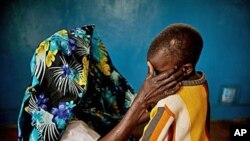Civilians, defense lawyers and activists are welcoming the sentencing Monday of an army lieutenant colonel and eight other soldiers in the mass rape of dozens of women in the eastern Democratic Republic of Congo. They say, though, it is just a small step in the fight against rampant rape in the war-torn country.
Hundreds of people jeered at the convicted as they were led away in handcuffs outside the makeshift courtroom in the lakeside Congo village of Baraka.
Defense lawyer Therese Kulungu said in her words "the untouchable has been touched." The reactions followed a military court sentence of between 10 and 20 years in prison for those convicted of a mass rape on New Year's Day in the nearby town of Fizi, in the mineral-rich and lawless South Kivu Province.
The main accused was former rebel-leader Lieutenant-Colonel Daniel Kibibi Mutware, who was reintegrated into Congo's army in 2009, as part of long-delayed peace agreements. He was sentenced to 20 years in prison after being found guilty of crimes against humanity for ordering his troops to rape, beat and loot the population of Fizi.
Forty-nine victims of the New Year's Day attack testified in court, and as part of the verdict, the senior judge said they should receive up to $10,000 in compensation from the government.
An activist against rapes in the Congo, Lisa Shannon, has been following the trial from the United States. Several years ago, she visited the area where the trial took place and found staggering statistics.
"It was common in women's groups for half of the women to have been gang raped within the last six months," said Shannon. "I visited villages in the area where 90 percent of the women had been raped. In all of the areas I visited in South Kivu, I did not visit communities that identified higher rates of rape than in that area. It was the highest."
She said women face an impossible choice of being stopped by competing groups of armed men and raped while going to farm their fields, or watching their children starve.
Despite growing attention to the problem, rapes are still reported on a regular basis from the eastern Democratic Republic of Congo, often committed by government soldiers. The medical charity group Doctors Without Borders said it had received credible reports of 30 new rapes last week in areas near Fizi.
Shannon called the trial an enormous first step in dealing with a total lack of justice and a culture of impunity. She said Congolese officials, activists, judges and defense lawyers cannot be expected to reverse this grim reality on their own.
"They are going to need a lot of help for a long time," said Shannon. "Security sector reform in Congo, building a justice system from the ground up, is an enormous task. It is going to take a long time and an enormous amount of support from the international community."
The United Nations, the U.S.-based Open Society Initiative and lawyer groups such as the American Bar Association and Lawyers without Borders helped pay costs and with logistics during the Baraka trial.
A senior legal adviser with the Open Society group, Kelly Askin, said now that the rule of law has started being enforced domestically she hoped the trial would have an impact on deterring future crimes.
One accused soldier was acquitted, and another believed to be 16 will be tried in a juvenile court. The 11 men brought to the court were the only ones identified by victims, but women at the trial said other rapists are still living in their community, including those involved in the New Year's attack. They said they were still being raped if they left their village.




